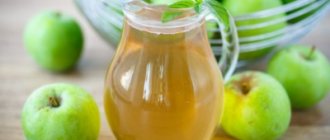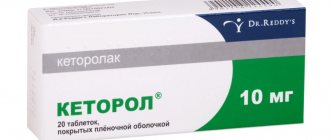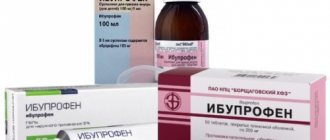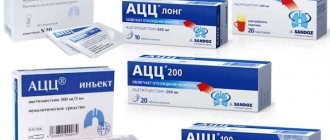Benefits for mother and baby
Fish oil is a dietary supplement made from the liver of cod fish. Many adults perceive it as something tasteless and smelling bad. Fortunately, advanced pharmaceuticals offer us not only to drink liquid fish oil, familiar from childhood, but also to take its purified analogue in capsules.
The exclusivity of the product lies in the content of a large amount of vitamins (A, E, D, etc.) and fatty acids, without which the human body cannot fully function.
Vitamin A is essential for good vision. Together with vitamin E, it is responsible for the condition of nails, skin and hair (many mothers who breastfeed their children note a deterioration in their condition).
Vitamin D helps in the absorption of calcium and phosphorus, which are necessary to strengthen the teeth and bones of a nursing mother. If there is a deficiency of this vitamin in the body, rickets develops. The disease is also dangerous for a baby because only a doctor can notice it. The vitamin is especially important for “winter” children, since in the first months of their life they usually experience a lack of sunlight.
Separately, it should be said about the importance of fatty acids, which:
- stimulate fat metabolism and have a beneficial effect on digestive processes;
- have a positive effect on the development of the children's nervous system;
- promote the production of the hormone of joy - serotonin, and therefore serve as a prevention of depression in nursing women;
- eliminate inflammatory processes;
- form immunity in the baby and strengthen the protective forces of the mother’s body;
- reduce cholesterol levels and prevent the occurrence of heart and vascular diseases;
- help wound healing;
- necessary for the formation of nerve fibers, cell membranes and connective tissue;
- prevent the onset of diabetes.
Regular intake of fish oil by a woman during breastfeeding promotes lipid metabolism, which, in turn, helps to get rid of extra pounds that “settled” in the body during pregnancy.
Composition and biological role
The wide range of beneficial effects of the nutrient for the body is due to its rich chemical composition. The natural substance contains fat-soluble vitamins A, D, E, a complex of unsaturated fatty acids omega three and omega 6, antioxidants and microelements.
Dr. Komarovsky’s opinion on the benefits of fish oil and Omega acids (video):
Vitamin complex
Vitamin A (retinol) helps cope with hair loss and brittle nails, eliminates dryness and flaking of the skin in the mother. The substance penetrates into breast milk and ensures the proper development of the baby’s visual organs. Vitamin D (cholecalciferol) is necessary for regulating the metabolism of phosphorus and calcium in the body, preventing the destruction of tooth enamel in women. D3 is very important for the baby - it ensures the normal formation of skeletal bones and provides individual prevention of rickets.
Omega-3 fatty acids
PUFAs have a complex positive effect on a woman’s body: improves the rheological properties of the blood and lipid profile, normalizes blood pressure, and has anti-inflammatory and antioxidant effects. Omega 3 acids are essential for breastfeeding, they increase milk production and improve its nutritional value. DHA and EPA in fish oil are essential substances for the formation of the child’s brain and sensory organs.
For weight loss
After childbirth, mothers often face the problem of excess fat deposits and metabolic disorders. Omega three acids help normalize the metabolism of carbohydrates and fats, increase the sensitivity of cells to insulin and the absorption of glucose by the body. The substance accelerates metabolism and promotes weight loss. Polyunsaturated fatty acids are also responsible for the production of biologically active compounds that regulate the feeling of hunger and satiety.
Coping with stress and postpartum depression
Thanks to the regulation of the production of the hormone of joy (serotonin), with a course of use of dietary supplements, it is possible to reduce anxiety, stress, and improve a woman’s condition with postpartum depression. Also, drugs with polyunsaturated acids are used to prevent these conditions.
To normalize the emotional state
A sufficient amount of DHA, contained in fish oil, is necessary for the normal functioning of mental processes. Supplements can help prevent the development of postpartum depression. The effect of acids on the emotional state is realized through an increase in the formation of active neurotransmitters (especially serotonin).
Contraindications
Despite the undeniable benefits of this dietary supplement for breastfeeding, its use should be treated with caution and all existing contraindications should be taken into account:
- sensitivity to components of fish oil and individual intolerance;
- pathologies in the gastrointestinal tract;
- kidney diseases;
- liver problems, including hepatitis and fatty liver disease (fatty liver);
- cholelithiasis;
- diseases of the heart and blood vessels;
- hypothyroidism and hyperthyroidism.
If you have a history of food allergies to seafood, don't rush into taking fish oil. It is better to consult an allergist.
Bottom line
Replenishing the supply of nutrients in the mother’s body, according to Dr. Komarovsky, is especially important for her health. Milk has a certain composition, which can only be affected by a severe deficiency of nutrients in the female body. In other cases, the baby will receive everything he needs, even if after milk production the mother develops a deficiency of vitamins or microelements.
Consumption of fish oil during breastfeeding is beneficial; it is among the foods allowed during lactation. Whether it can be taken depends on the child's reaction. Before taking a dietary supplement, you need to agree with your doctor to clarify the dosage and regimen, since an excess can be harmful to the body of the mother and baby.
How to drink correctly
If you decide to take fish oil and at the same time breastfeed your baby, you should consult your doctor. During lactation, it is better to choose a nutritional supplement in the form of capsules. It is believed that this does not affect the smell and taste of breast milk.
You should start taking it with one capsule, after which a break is necessary, during which the mother can observe the condition of the baby and his reaction to the drug.
During this period, the woman needs to refrain from eating new foods that are not yet familiar to the baby, so that in the event of an allergy there is no doubt about the causes.
If there is no reaction, after 2-3 days you can take fish oil daily in the dosage prescribed by your doctor.
The average daily dose is 1 tsp, or 1-3 capsules.
In order to prevent colic in the baby due to changes in the composition of milk, the mother needs to monitor the amount of fat in her diet and avoid fatty foods. Compliance with this recommendation will also significantly reduce the risk of lactostasis, which is often caused by mother’s milk being too fatty.
Russian doctors advise taking the drug in the autumn-winter period according to the following scheme: 1 month on - 1 month off.
What products does it contain?
It is not necessary to take medications to enrich the body with polyunsaturated fatty acids. Omega-3 is found in some foods. Most of this substance is found in fish and seafood.
It is useful to eat red and black caviar, herring, tuna, mackerel, salmon, trout, salmon, halibut, and cod. It is recommended to stew or boil the fish. It is important to remember that seafood is prohibited in the first months after childbirth due to the high risk of developing an allergic reaction.
Omega-3 is also found in the following foods:
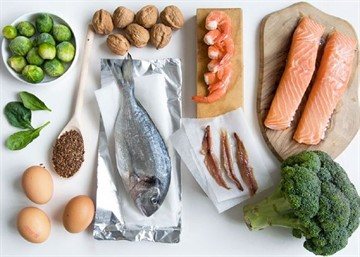
- flaxseed, sesame, olive, rapeseed oils;
- canned cod liver;
- dried soybeans;
- Brussels sprouts;
- chickpeas;
- oat seedlings;
- walnuts;
- lentils>;
- brown rice>;
- wheat germ;
- dry beans;
- pistachios;
- chicken eggs>;
- pecans;
- spinach;
- almond;
- avocado oil;
- pumpkin seeds.
It should be taken into account that polyunsaturated fatty acids can change the taste of milk. As a result, the baby may refuse to breastfeed.
Cosmetic bonuses
Fish oil is a multifaceted product and, among other things, has a positive effect on women’s appearance. This dietary supplement contains a lot of vitamin E, which is called the “vitamin of beauty and youth.” Regular use slows down the natural aging of the skin, restores elasticity and starts regeneration processes.
The scope of application of fish oil is not limited to oral administration. Homemade masks have demonstrated high effectiveness. It is important that even those mothers whose children are allergic to the drug can use them. With this use, potential allergens do not penetrate into breast milk and therefore cannot harm the baby.
To prepare homemade cosmetics based on fish oil, you can use both liquid preparation and capsules. Let's look at a few recipes.
Face masks
- Combine bee honey, liquid fish oil and water in equal quantities (1 tablespoon each). Mix everything until smooth and apply to facial skin. After 30 minutes, rinse with warm water without soap.
- 1 tbsp. l. combine fish oil with the same amount of heavy cream and lemon juice. Mix all ingredients. Apply to face for 20 minutes. It is recommended to rinse off with warm water.
- For dry and flaky skin, split 2 capsules of fish oil and mix the contents with 1 tbsp. l. dry yeast and 2 tbsp. l. warm milk. Wait 15-20 minutes (during this time the yeast should activate). Next, add the egg yolk to the mixture and mix until smooth. Leave on the skin for 20 minutes, then rinse with warm water.
Hair Mask
- Mix egg yolk in equal proportions with fish oil, honey, burdock, olive and almond oils. The volume of the mixture will depend on how long and thick your hair is.
- Heat the components in a water bath to a temperature comfortable for the skin.
- Distribute the mixture evenly throughout your hair and leave for 30 minutes.
- Rinse thoroughly with shampoo.
This should be done at least once a week.
Nail care
To strengthen your nails, you need to mix fish oil, lemon juice, olive and sea buckthorn oils in equal proportions. Apply the resulting mixture to your nails and leave until completely dry. This nail strengthening method will show noticeable results if done once a week.
Reviews from young mothers
Natalya: I am the mother of two wonderful twins. My pregnancy was not easy, because the load on the body was double. After giving birth, I felt incredibly tired, constantly wanted to sleep, and depression set in. The doctor advised me to drink fish oil capsules (1 piece 2 times a day for a month). I was very worried about how this would affect my children, since we are on breastfeeding. But they tolerated the drug perfectly. A month later, my health improved noticeably. A pleasant bonus was the wonderful condition of my hair and skin. Victoria: After my first birth, my hair fell out a lot. I even thought that I would have to buy a wig. But as it turns out, this is a common problem for women who are breastfeeding. Therefore, when I became pregnant with my second child, I immediately began studying this topic. My gynecologist advised me to start taking fish oil during pregnancy. I took it in courses: one month after another. The baby was born healthy, and my luxurious hair still causes the envy of my friends.
Can a nursing mother have olive oil?


